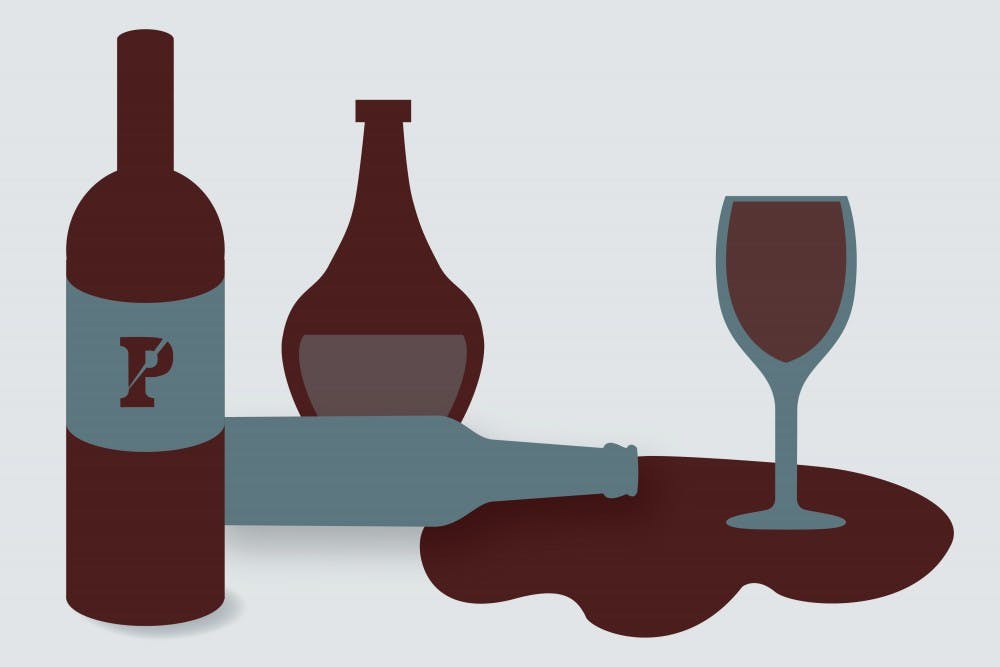
College alcohol policies nationwide have come under scrutiny recently following increased attention to sexual assault and other alcohol-related dangers. The Daily Pennsylvanian rounded up the details of each school's policies.
Penn
Penn officially prohibits underage drinking but allows students over the age of 21 to possess alcohol in residential areas, and residential deans have the authority to govern alcohol monitoring in their respective houses. Usually, students found possessing alcohol do not face legal consequences.
Parties serving alcohol must register with the University and are required to hire University-approved security and bartenders. Hard liquor is not permitted at on-campus events, but may be served at events held by third-party vendors, such as parties at downtown clubs. Additionally, events with alcohol are required to supply non-alcoholic beverages as well as food and must not discuss alcohol in their advertisements.
Many of these rules are effective in regulating alcohol consumption at on-campus events, but students tend to avoid these policies by holding off-campus parties, and underage drinking remains an important aspect of social life at Penn.
However, Penn’s policies are ultimately designed with student safety in mind. Penn’s medical amnesty policy ensures that students seeking medical attention for themselves or a friend after substance use will not be held legally responsible for underage drinking.
Although Ivy League universities are unified in their prohibition of underage drinking, a closer look at minor policies reveals there is not total agreement about how to regulate student alcohol use.
Brown
Brown prohibits alcohol in all residential areas, including Greek houses, and events with alcohol may only be held in supervised public areas for students of legal age. Parties serving alcohol are also banned during certain periods of the year, such as reading days and finals. Brown’s medical amnesty policy also requires students who receive medical attention to follow up with an educator.
Columbia
Columbia bans alcohol in certain residence halls but allows residence staff to give several warnings to students caught with alcohol before referring them to higher administration. Events at Columbia with alcohol must be registered and must follow specific guidelines — according to Columbia’s website, alcohol “not specifically manufactured for human consumption” is prohibited, and students of legal age must provide double proof of identification.
Cornell
Alcohol use in residences on- or off-campus is governed by individual residential contracts, and students of legal age are permitted to possess and consume alcohol in Cornell dorms. Like Penn, Cornell students must register events that will involve alcohol with the university. However, Cornell's Office of Fraternity and Sorority Affairs maintains its own process of approval and registration for events with alcohol.
Dartmouth
Recently, Dartmouth took the drastic step of imposing a campus-wide ban on hard alcohol. At Dartmouth, students of legal age can drink in many university spaces, including residences, but the regulations specifically ban public intoxication. Students who violate the rules are required to take part in intervention programs. These programs are also mandatory for students who are hospitalized for alcohol-related reasons.
Harvard
Harvard permits students of legal drinking age to drink alcohol in their rooms and host alcohol-related events, but there is a limit to how many students are allowed in one room at a time. Larger social events are permitted to have alcohol only if they will be attended by Harvard students — Harvard’s website says alcohol is always banned at events with attendees from “beyond the Harvard community.”
Princeton
Princeton’s alcohol policies emphasize the seriousness of pressured drinking and expressly forbid forcing students to drink in hazing situations. Students who are of legal age are allowed to drink in many areas but cannot provide alcohol to others without permission, regardless of the age of the recipients. Like other universities, students who violate the rules are subject to warnings before facing any disciplinary action.
Yale
Yale students who are of legal drinking age are allowed to drink in residential areas, but students who wish to host events with alcohol are subject to extensive regulations. The rules emphasize bars at parties must be well-lit and there must be a physical separation between alcoholic beverages and non-alcoholic beverages or food. Additionally, all Yale parties are banned from serving grain alcohol.
The Daily Pennsylvanian is an independent, student-run newspaper. Please consider making a donation to support the coverage that shapes the University. Your generosity ensures a future of strong journalism at Penn.
DonatePlease note All comments are eligible for publication in The Daily Pennsylvanian.





